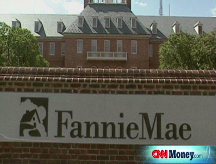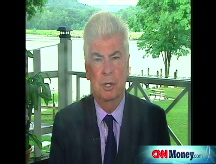Fannie, Freddie: Not out of the woods
A day after government unveils rescue plan, mortgage backers' stocks take wild ride even as lawmakers offer support.
NEW YORK (CNNMoney.com) -- The federal government's plan to rescue Fannie Mae and Freddie Mac won support from some experts and politicians Monday but did not fully assure investors in the beleaguered mortgage finance giants.
Share prices of Fannie and Freddie, continuing their weak run, fell to fresh 17-year lows. Their performance was troubling because the two firms are crucial sources of home loan funding and key to any recovery of the battered housing market and the broader economy.
The Treasury Department and Federal Reserve announced steps Sunday to make funds available to the firms if necessary. Experts said the success of the efforts will ultimately be measured by market reaction.
Shortly after the U.S. markets opened, shares of Fannie (FNM, Fortune 500) jumped as much as 32%, while shares of Freddie (FRE, Fortune 500) jumped 26% higher. By early afternoon, they had fallen deeply into negative territory before rebounding a bit at the end of the day.
Fannie ended the day down 5% while Freddie closed with an 8% loss.
Things were a touch better in credit markets, as Freddie received good prices on $3 billion in corporate debt it sold through auction early Monday morning.
Three-month bonds sold at a slightly lower interest rate than Freddie's previous auction a week earlier, while the six-month bond sold for only a narrowly higher price, according to wire service reports. That suggests that investors are more confident about the near term outlook for the firms than the long-term.
Treasury Secretary Henry Paulson said Sunday that the Bush administration plans to ask Congress to pass legislation that would temporarily extend lines of credit from Treasury to the mortgage providers. The firms now have authority to borrow up to $2.25 billion each from Treasury. A Treasury spokeswoman said the department had not yet set a new limit it would ask Congress to authorize.
Paulson also proposed that Treasury be given authority to buy equity in the companies, although a Treasury spokeswoman said Monday that the department did not expect to need to use the authority, that it was only proposed as a "back-stop" to be used on an "as-needed" basis.
Sen. Christopher Dodd, D-Conn., told reporters Monday afternoon that he hoped the proposals could be passed by both the House and Senate as early as this week.
The Paulson plan could be attached to a pending housing bill, Dodd said. The housing measure, which strengthens the regulatory oversight of the firms as well as provide relief for homeowners facing foreclosure, was passed by the Senate on Friday and was expected to go back to the House this week.
Dodd said he believed that the result of Freddie's debt offering was a sign that the markets have more confidence in the outlook for the two firms, even if their stock prices have taken additional hits.
"It looks as least that first blush that these ideas that are being floated are having the desired effect and that is to calm things down here and to restore some confidence that the people need to have in these [firms]," he told CNNMoney earlier in the day.
Paulson and Securities and Exchange Commission Chairman Christopher Cox have agreed to testify before Dodd's Senate Banking Committee on Tuesday. Federal Reserve Chairman Ben Bernanke had already been set to testify before the committee Tuesday to give his semi-annual update on his view of the economy.
In addition to the Treasury statement Sunday evening, the Fed announced that the Federal Reserve Bank of New York had been granted authority to lend to Fannie and Freddie should such lending prove necessary. The Fed has traditionally only lent money directly to commercial banks, but since it helped engineer a purchase of Bear Stearns in March, it has allowed Wall Street firms to also tap into that source of funds, known as the discount window.
"This plan meets the policy requirements for a rescue," said Jaret Seiberg, a financial services analyst for the Stanford Group, a Washington research firm, in a note Monday morning. "It provides emergency liquidity measures and establishes a mechanism for injecting capital into the enterprises if needed."
Both companies said that they have adequate capital and that it is possible they might not need to turn to the Fed or Treasury for funds. The Office of Federal Housing Enterprise Oversight, the federal regulator that oversees the firms, also said on Sunday that the companies have enough capital.
Seiberg said it's too soon to tell if the plans announced Sunday are enough to see Fannie and Freddie through the current crisis.
"Ultimately, the success or failure of this plan rests with the market," he said.
University of Central Florida economist Sean Snaith said he agrees that the actions by Treasury and the Fed were prompted by market concerns more than any imminent problem the firms might have continuing normal operations.
"Using the stock market as a barometer is difficult to do in a case like this," Snaith said. "This crisis is essentially a crisis of confidence, and that confidence takes some time to restore."
The two firms, which were set up by the government, own or back about $5 trillion worth of home debt - half the mortgage debt in the country. They have suffered about $12 billion in losses between them since last summer.
Since the crisis in credit markets last year, they have become virtually the only source of funding for banks and other home lenders looking to make home loans. Their ability to do so is crucial to the recovery of the battered home market and the broader U.S. economy.
Despite their government-sponsored status, they are owned by shareholders, and those investors drove shares down by nearly half last week on concerns that they would not be able to raise the capital they need to cover future losses. The declining share price made it more difficult and expensive to raise that capital. Fear was rampant on Wall Street last week that a government bailout would leave shareholders' stake worthless.
-- CNNMoney.com staff writer Aaron Smith contributed to this report. ![]()




